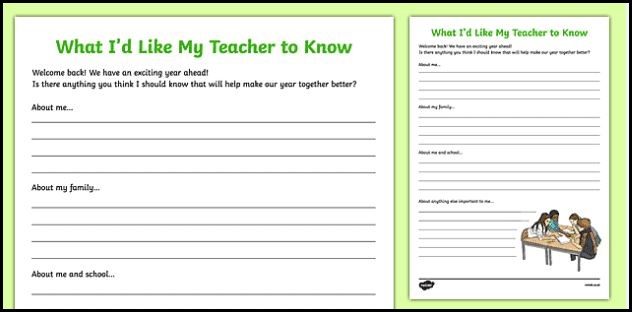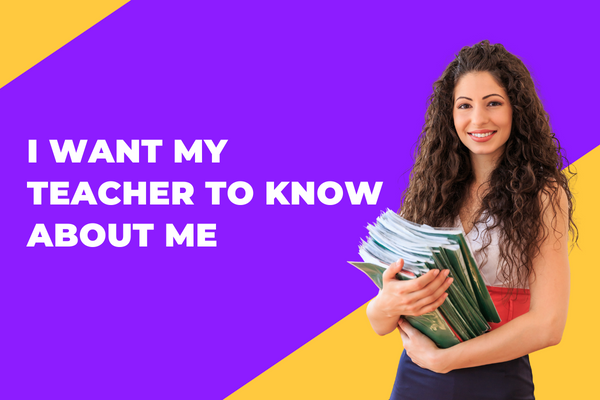When creating a learning profile, what information should be incorporated? What is the purpose of having such a profile and how will it be utilized? You’ll get here the 5 things I want my Teacher to know about me. Learning profiles provide a brief overview of academic data. While this approach is practical and fundamental, it does have its limitations.
To explore a different method, following Grant Wiggins’ suggestion, let’s reverse our thinking. Moreover, let’s do this by focusing on one overarching concept that ties everything together. It may be difficult to pinpoint a single idea that is both comprehensive and practical, but let’s attempt it by first addressing some foundational assumptions.
Top 5 things I want my teacher to know about me
- I am a diligent and dedicated learner who strives for excellence in every aspect of my education. I am committed to putting in the necessary effort and time to achieve my academic goals.
- I have a strong passion for the subject you teach. Whether it’s mathematics, literature, or any other subject, I genuinely enjoy learning and exploring new concepts within the field.
- I am an independent thinker and actively seek out opportunities to expand my knowledge beyond the classroom. I am not afraid to ask questions or engage in discussions to gain a deeper understanding of the material.
- I believe in the power of collaboration and teamwork. I enjoy working with my peers on group projects and believe that collective efforts can lead to innovative and insightful outcomes.
- I am open-minded and receptive to effective feedback. I understand that constructive criticism is an essential part of the learning process, and I am always eager to improve and grow as a student.
What my teacher should know about my worksheet?
Be sure to explore this back-to-school activity pack designed for 6th graders.

What Good Teachers Know About the Students?
- Critical medical needs
- Native language
- Individualized Education Programs (IEPs), 504 plans, gifted education, and other related services
- “Living Arrangements”, encompassing aspects such as religious convictions, security measures, dietary provisions, familial relationships, availability of reading materials, technological resources, and more.
- Grade Point Average and academic strengths
- Choose your favorite subjects
- Education levels & reading habits
- Their response to accountability
- Classroom citizenship habits
- Academic expectations, which encompass distinguishing between personal objectives and familial aspirations.
- How to ‘motivate’ them
- Trend in overall academic advancement during the past 1-3 years
- Advancement in achieving mastery of power standards/data obtained from pertinent standardized assessments.
Additional reading to know about me
Additional reading to know about you:
- “The Power of Introverts” by Susan Cain: This book explores the strengths and qualities of introverted individuals and how they can thrive in various environments. It may help your teacher understand your preferred learning style and how to support your needs.
- “Grit: The Power of Passion and Perseverance” by Angela Duckworth: This book delves into the concept of grit and its impact on achieving long-term success. It could provide insights into your determination, resilience, and commitment to your education.
- “Mindset: The New Psychology of Success” by Carol S. Dweck: This book explores the differences between a fixed mindset and a growth mindset and how they affect learning and personal development. It may help your teacher understand your mindset and how to foster a growth-oriented environment.
- “The Highly Sensitive Person” by Elaine N. Aron: This book focuses on individuals with high sensitivity and offers strategies for navigating the world with this trait. It could shed light on your unique sensitivity to stimuli and help your teacher create a comfortable learning environment for you.
- “Quiet: The Power of Introverts in a World That Can’t Stop Talking” by Susan Cain: This book delves into the experiences and strengths of introverted individuals, highlighting the value they bring to society. It may provide your teacher with a deeper understanding of your introversion and how to create inclusive classroom dynamics.
These book recommendations are meant to provide insights into certain aspects of your personality and learning style. Sharing these books with your teacher can open up avenues for understanding.
Read also related topics: How to become a Teacher in Texas without a Degree?
10 Financial Benefits of Being a Teacher
Teacher Write-Up for Unprofessional Behavior
A Student Is Standing 20 Feet Away From The Base
What Great Teachers Know About Their Students?
Great teachers know that each student is unique and possesses individual strengths, weaknesses, and learning styles. They understand that:
- Building a connection: Great teachers prioritize building positive relationships with their students. They take the time to know their students on a personal level, showing genuine interest in their lives, aspirations, and challenges. This connection fosters trust and creates a safe and supportive learning environment.
- Differentiated instruction: Recognizing that students have diverse learning styles and abilities, great teachers adapt their teaching strategies to meet individual needs.
- Strength-based approach: Great teachers identify and celebrate each student’s unique strengths and talents. They provide opportunities for students to showcase their abilities and build confidence. They foster a positive self-image to reach their full potential.
- Growth mindset: Great teachers instill a growth mindset in their students. They believe in their students’ ability to learn and grow, emphasizing effort, and resilience. They provide constructive feedback and encourage students to embrace challenges as opportunities for growth.
- Culturally responsive teaching: Great teachers value and respect the diverse backgrounds and experiences of their students. They integrate culturally relevant content and perspectives into their lesson plans, ensuring that all students feel seen, and represented. They create inclusive classrooms that promote cultural understanding.
Skilled educators comprehend the significance of establishing connections, customizing instruction, acknowledging aptitudes, cultivating a mentality for continuous improvement, and embracing diversity.
By possessing a profound understanding of their students, they can construct a caring and all-encompassing learning atmosphere that facilitates the academic and personal development of each student.
What do I wish my teacher knew about my examples?
“I wish all my teachers knew about is that I’m a goofy goober and sometimes I give up.” I wish that my teachers knew that I am terrible at math; it’s not that I’m not trying
What I wish my teacher knew about me:
- I am an avid reader outside of school. Books have always been a passion of mine, and I often find inspiration and new perspectives from the stories I read.
- I have a knack for visual learning. Using visual aids and diagrams helps me grasp and retain information more effectively. Incorporating visuals into the classroom would greatly enhance my learning experience.
- I am a natural problem solver. I enjoy tackling complex challenges and thinking critically to find innovative solutions. Providing opportunities for hands-on problem-solving activities would engage me and tap into my strengths.
- I have a strong sense of empathy and enjoy helping others. Collaborative projects that involve working together to make a positive impact in our community would be incredibly meaningful to me.
These are just examples, and it’s important to communicate your unique thoughts and wishes to your teacher directly. Sharing these insights can help your teacher better understand and support you in your educational journey.
What I wish my teacher knew about me examples
Here are a few unique short answer examples to “What I wish my teacher knew about me”:
1. “I’m a late bloomer. It might take me a second to understand, but when I do, it sticks like wildfire.” (Highlights learning style and potential)
2. “The quiet library isn’t always my friend. Give me a whiteboard and markers, and watch sparks fly.” (Demonstrates preferred learning environment)
3. “My dog ate my homework… no, really! He has a thing for Shakespeare.” (A humorous way to address occasional difficulties)
4. “I speak fluent sarcasm, but underneath it all, I’m a passionate advocate for ocean conservation.” (Reveals hidden interests and personality)
5. “Math formulas make my eyes glaze over, but show me a historical map, and I’m a cartographer in the making.” (Points to specific talent and potential learning preferences)
Remember, the best examples are personal and genuine!
Last Word
These five aspects I want my teacher to know about me provide a glimpse into who I am as a student and an individual. Understanding my diligence, passion for the subject, independent thinking, and openness to effective feedback will help my teacher create an environment that nurtures my potential and supports my growth.
My teacher can foster a positive and inclusive learning experience, empowering me to thrive academically and personally.

